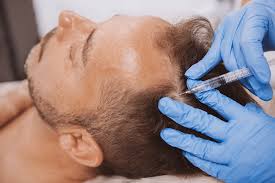Hair loss is a common concern that affects millions of people worldwide. The impact on self-esteem and confidence can be profound, whether it’s thinning hair, receding hairlines, or bald patches. But what causes hair loss, and is there anything you can do?
To understand hair loss, it’s essential to grasp the basics of the hair growth cycle. Hair goes through three main phases: the anagen phase (growth), the catagen phase (transitional), and the telogen phase (resting). At any given time, a certain percentage of hair follicles are in each phase. Hair loss occurs when this cycle is disrupted, leading to an imbalance between hair loss and regrowth.
Common Causes of Hair Loss
Hair loss can be attributed to various factors, including genetics and lifestyle choices. Understanding the underlying cause is key to determining the most effective hair loss treatment for men for your needs.
Genetics and Hormones
Hair loss is hereditary for many individuals and can be traced back to genetic predispositions. Male pattern baldness, also known as androgenetic alopecia, is the most common form of hair loss in men, while female pattern baldness affects women. Hormonal changes, such as those experienced during puberty, pregnancy, and menopause, can also contribute to hair loss.
Natural Remedies As a Hair Loss Treatment For Men
While there’s no one-size-fits-all solution for hair loss, several natural remedies and lifestyle changes may help promote hair growth and reduce shedding. Regular scalp massage with essential oils like rosemary, peppermint, and lavender can improve blood circulation and stimulate hair follicles. These oils have been shown to have anti-inflammatory and antioxidant properties, which may support hair growth.
Medical Interventions As a Hair Loss Treatment
Medical interventions may be necessary for individuals experiencing significant hair loss to halt further progression and promote regrowth.
Minoxidil and Finasteride
Minoxidil, commonly known as Rogaine, is an over-the-counter medication approved by the FDA for treating hair loss. It increases blood flow to the scalp and prolongs the anagen phase of the hair growth cycle. Finasteride, sold under the brand name Propecia, is an oral medication that blocks the conversion of testosterone into dihydrotestosterone (DHT), a hormone that contributes to hair loss in men.
Platelet-Rich Plasma (PRP) Therapy
PRP therapy involves drawing a small amount of your blood, processing it to concentrate the platelets, and injecting this plasma into your scalp. The growth factors in the plasma can stimulate hair follicles, promoting hair growth and improving hair density. This treatment has gained popularity for its natural approach to hair loss treatment for men.
Surgical Solutions for Hair Loss
Surgical options such as hair transplants can provide effective results for those looking for more permanent solutions.
Follicular Unit Transplantation (FUT) and Follicular Unit Extraction (FUE)
FUT and FUE are two common techniques used in hair transplantation. FUT involves removing a strip of scalp from the donor area, dissecting it into individual follicular units, and transplanting them to the thinning or balding areas. Conversely, FUE involves harvesting individual follicular units directly from the donor area and transplanting them. Both methods can yield natural-looking results, but FUE is less invasive and leaves minimal scarring.
Lifestyle Changes for Healthier Hair
In addition to natural remedies and medical interventions, certain lifestyle changes can significantly promote hair growth and prevent further hair loss.
Balanced Diet and Hydration
A balanced diet rich in vitamins, minerals, and essential fatty acids is essential for healthy hair growth. Incorporating foods like salmon, avocados, spinach, and nuts can provide the nutrients your hair needs to thrive. Additionally, staying hydrated by drinking plenty of water can help keep your scalp and hair follicles healthy.
Stress Management and Sleep
Chronic stress can lead to hair loss by disrupting the hair growth cycle. Incorporating stress management techniques such as yoga, meditation, and regular exercise can help reduce stress levels. Additionally, ensuring you get enough sleep each night is crucial for your overall health and hair vitality.
Innovative Hair Loss Treatments for Men on the Horizon
The field of hair loss treatment is continually evolving, with new and innovative solutions emerging regularly.
Low-Level Laser Therapy (LLLT)
LLLT involves using low-level lasers to stimulate hair follicles and promote hair growth. This non-invasive treatment is becoming increasingly popular due to its ease of use and effectiveness. Devices like laser combs and helmets can be used at home, making it a convenient option for many individuals.
Stem Cell Therapy
Stem cell therapy is an exciting area of research in hair loss treatment. This therapy uses stem cells to regenerate hair follicles and promote new hair growth. While still in the experimental stages, stem cell therapy holds promise for the future of hair restoration.
Psychological Impact of Hair Loss
Hair loss can have a profound psychological impact, affecting self-esteem and quality of life. Understanding this aspect is crucial for comprehensive hair loss treatment for men.
Emotional Well-being and Support
Seeking emotional support from friends, family, or support groups can help individuals cope with the psychological effects of hair loss. Professional counseling or therapy may also benefit those struggling with self-esteem issues related to their appearance.
In conclusion, hair loss is a common concern that can significantly impact self-esteem and confidence. However, it’s possible to address hair loss and promote healthy hair growth with the right approach. Whether you opt for natural remedies, medical interventions, or lifestyle changes, options are available at Cachet SMP to help you regain control of your appearance and feel confident.
